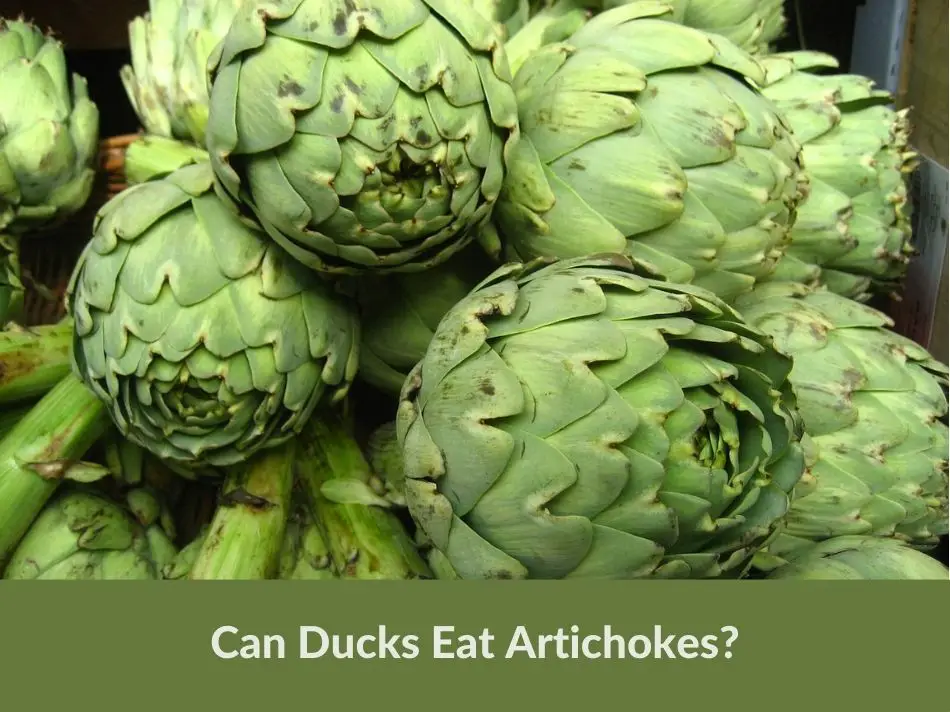In their natural habitats, ducks typically munch on a diverse diet that includes small insects, aquatic plants, seeds, and even tiny fish. While domestic ducks often eat duck pellets, grains and mealworms. But, can ducks eat artichokes?
Yes, ducks can eat artichokes. It can be a healthy and nutritious snack, but it needs some preparations first. Always boil the artichoke and make small bite sizes before feeding your ducks.
In this article, readers will learn about the suitability of artichokes as an occasional treat for ducks.
How Often Can I Feed My Ducks Artichokes?
Like all treats, moderation is key! While artichokes can be a novel snack for ducks, they shouldn’t replace their primary diet. Consider artichokes as an occasional treat, perhaps once a week. And remember, ducks love variety. So, ensure you’re alternating treats to give them a diverse diet.
Can Ducklings Eat Artichokes?
Ducklings have sensitive digestive systems and are primarily geared towards high protein foods for growth in their early stages. While artichokes won’t harm them, they aren’t particularly beneficial for these little quackers either. It’s best to stick to their recommended feed and save the artichoke tasting for when they’re a tad older.
Artichokes Nutritional Value
Below is the nutritional value of 100 grams of artichokes.
- Calories: 47
- Protein: 3.3 g
- Carbohydrates: 11.4 g
- Dietary Fiber: 5.4 g
- Water: 84.94 g
It also contains several vitamins and minerals as listed below.
- Folate
- Copper
- Magnesium
- Vitamin C
- Niacin
- Riboflavin
Potassium - Phosphorus
- Vitamin B6
Are Artichokes Healthy for Ducks?
Artichokes, as we know, are packed with nutrients beneficial for humans. For ducks, while not a natural part of their diet, they offer dietary fiber and a few vitamins and minerals. However, ensure that the artichoke leaves are soft enough to prevent any choking hazards.
- Folate (Vitamin B9): Critical for cell division, folate is essential during the growth phase of ducklings and helps prevent anemia, ensuring ducks have consistent energy levels.
- Copper: Beyond its metallic properties, copper is vital for ducks. It supports feather formation, pigmentation, and promotes healthy bones and connective tissues.
- Magnesium: Integral to energy production, magnesium also supports muscle and nerve function, allowing ducks to move and fly effectively.
- Vitamin C: This vitamin is important for collagen formation, which is essential for a duck’s skin, scales, feathers, and beak. It also aids in boosting the immune system.
- Niacin (Vitamin B3): Vital for energy metabolism, a niacin deficiency in ducks can result in health issues, including “limber neck”, a condition where ducks exhibit a drooping neck.
- Riboflavin (Vitamin B2): Riboflavin is essential for energy production in ducks and helps maintain their healthy skin and feathers.
- Potassium: Like all active animals, ducks require electrolyte balance. Potassium assists with fluid balance, nerve transmission, and muscle contractions.
- Phosphorus: This mineral works with calcium to strengthen the bones and beak of ducks. It also plays a role in energy metabolism.
- Vitamin B6: Important for protein metabolism, vitamin B6 ensures efficient protein utilization in ducks, supports brain health, and is involved in their reproductive cycles.
How To Feed Artichokes To Ducks
Feeding ducks might seem like a simple affair, but when introducing unfamiliar foods like artichokes, there’s a right way to do it to ensure their safety and enjoyment. Here’s how you can safely treat your ducks to some artichoke goodness:
- Wash Thoroughly: Always begin by washing the artichokes to remove any pesticides or chemicals if they aren’t organic. Ducks are sensitive to these chemicals, and it’s best they consume the purest form of any treat.
- Soft Preparation: Ducks don’t have teeth and rely on grinding their food in their gizzard. To aid this process, consider steaming or boiling the artichoke leaves until they’re soft. This ensures they can digest them without any issues.
- Sizing: Once softened, cut the artichokes into manageable, bite-sized pieces. This prevents choking hazards and makes it easier for them to consume.
- Slow Introduction: As with any new food, start slow. Offer a small amount initially to gauge their reaction and ensure there are no adverse effects.
- Always Water: Ducks use water to help them swallow and digest their food. Whenever you’re giving your ducks any treat, make sure there’s a plentiful supply of fresh water nearby.
Other Berries Ducks Can Eat
Ducks are surprisingly versatile eaters and can enjoy a variety of vegetables as part of their diet. While moderation is always the key, many vegetables are safe and beneficial for ducks when introduced properly. Below are a few more veggies ducks loves to eat.
Conclusion
Artichokes aren’t a common part of a duck’s diet, but they can serve as an occasional treat. Both caretakers and park visitors should prioritize the health of ducks when offering food. It’s important to introduce new foods to ducks slowly and with caution. Additionally, always provide sufficient water when feeding them any treats.
Disclaimer: The information in this article is for informational purposes only. I'm not an expert or a veterinarian.


